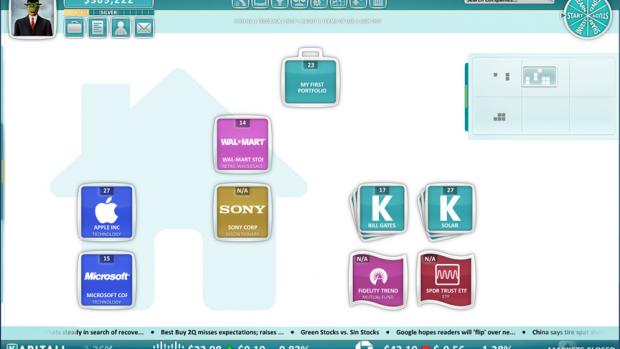Fun and Finance: Are the two mutually exclusive? - NYU-Poly Students Answer the Question

Today’s economic woes cause some of us to reach for a game console or stay in with a DVD. We want to forget our troubles. Others seek control and a method for recouping financial losses. Can both desires be fulfilled? Yes, easily: try Kapitall.
That’s what students did after the New York-based company gave presentations at NYU-Poly last spring and early this October. Kapitall sought beta testers for its online investing platform, which targets 25- to 40-year-olds, a demographic well represented by NYU-Poly’s BS, MS, and PhD students.
But more than age, Kapitall was drawn to NYU-Poly’s students who are inspired by the school’s i2e (invention, innovation, and entrepreneurship) ethos. i2e struck the company, itself an NYC-based start-up, as “perfect,” says Sally Wood, Kapitall’s chief of operations. NYU-Poly jumped to the top of a list of schools the company wanted to work with, beating out MIT, Columbia, and the Wharton School of Business at the University of Pennsylvania, among others.
Advantage NYU-Poly
“It’s fun,” says junior Manan Suneja, a computer engineering major and one of the beta testers who got an early preview of the web-based application. “You know how software can be really boring? Just figures and stats? This actually attracts college students.”
Kapitall is a free, not-yet-public, web-based application that gives users a chance to play the market and, for those new to investing, an opportunity to learn what it’s all about. There’s no need to download software, with the site resembling a desktop complete with company icons and portfolios to drag and drop, as well as comparative data sets. Users can customize this workspace — Kapitall’s designers call it “the playground” — which hovers above a continuous stock ticker that tracks the companies you’re watching. There’s also a social networking component, with users able to invite friends for trading opinions or making stock recommendations.
Hey, kid, we’re talking to you
The company strives to draw a youthful crowd. “Many existing financial services companies ignore the younger investor, but we think there’s a real opportunity to engage them in a new way,” Wood explains. “Kapitall is definitely not a game, but we’ve used video game constructs to make it more engaging, more intuitive. We think those constructs will resonate with a younger audience because they’ve grown up with games.”
Sophomore Madhurya Nangia, also a computer engineering major, believes Kapitall’s reach can extend even farther. “Any newbie who probably doesn’t even know how to use a computer can use it,” he says. “I would recommend it to children. It’s great.”
He too signed up to be a beta tester and, like Suneja, sings Kapitall’s praises. Neither is alone in that admiration, with Kapitall repeatedly singled out for attention among the many companies featured at this year’s Finovate, the annual conference for financial innovation. When asked about the company’s success, Wood points to the site’s user interface. “It really takes advantage of the online environment. It’s not just a print product moved to the web in a print format,” she explains. “It allows for the manipulation of objects and easy access to data. Besides, it’s incredibly fun to use.”
Don’t pay to play
“Fun” is an adjective you hear a lot when people talk about Kapitall, but fewer remarks are made about the company’s social motives. “Among the founders was the feeling that alternatives for learning about investing from free sites were not that sophisticated or comprehensible,” Wood says. Only paying customers could access more complex, data-filled sites. Kapitall was built to bridge the gap between the two modes.
“In this financial climate, people have realized they need to understand more about markets and investing and about their own approach in particular,” Wood says. “We want to make it much simpler and more transparent to do that.”
From start to finish
If Kapitall is trying to grow investors and empower average Joes and Jills, its egalitarian ethic doesn't change the fact that the company is still an investment itself, a start-up hoping to grow along with its audience. Their entrepreneurial efforts haven’t been lost on the beta testers, who see their participation as an invaluable opportunity.
“What we see in the market is a finished product. We can’t tell how it started,” Nangia says. “I looked at Kapitall from the beginning. I know how it changed. So maybe in other things I can know what are better ways to program, how a finished product is made from scratch.”
His passion for the entrepreneurial and innovative aspects of a business like Kapitall mirrors the company’s values. No wonder it chose NYU-Poly.
Recess, not recession
You can still sign up to be a beta tester for Kapitall. Just visit www.kapitall.com, enter your email address (very important), and you’re good to go.
There’s no closing date yet, but why wait? You’re given the chance learn about investing in an inviting online atmosphere, and when the company goes live and you’re ready to buy and trade for real, that play money you toyed with will have you emphasizing the “recess” in recession.




